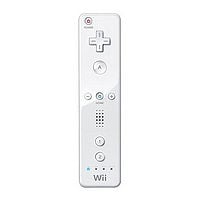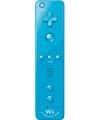Wii Remote: Difference between revisions
m (→Gallery: Did I really put that?) |
m (→Controls) |
||
| Line 33: | Line 33: | ||
*Home button: Opens up the home menu, where the player can go to the Wii menu or reset ''Super Smash Bros. Brawl''. Can be used similar to pausing. | *Home button: Opens up the home menu, where the player can go to the Wii menu or reset ''Super Smash Bros. Brawl''. Can be used similar to pausing. | ||
'''Note:''' Because there is no way to avoid jumping when pressing Up for this control scheme, the only way to use an [[up tilt]] is to be holding up while doing some other action. | '''Note:''' Because there is no way to avoid jumping when pressing Up for this control scheme, the only way to use an [[up tilt]] with [[tap jump]] on is to be holding up while doing some other action. | ||
===Wii Remote and Nunchuk=== | ===Wii Remote and Nunchuk=== | ||
Revision as of 15:27, August 21, 2013
The Wii Remote, also nicknamed "Wiimote", is the primary controller for Nintendo's Wii console. The main features of the Wii Remote are its motion sensing capability, which allows the user to interact with and manipulate items on screen via movement and pointing, and its expandability through the use of attachments. In 2008, an accessory for the Wii Remote was released, the Wii MotionPlus. This gave the Wii Remote slightly enhanced motion control. In 2011, the Wii Remote Plus was released, which featured the accessory installed inside the Remote.
The Wii Remote is a controller for Super Smash Bros. Brawl. It can either be turned sideways, like an NES controller, or be playable with the Nunchuk accessory.
As an added bonus, whenever one selects a character while using a Wii Remote (Or any attachments to it like the Classic Controller), the character they selected will deliver a line through the Wii Remote's speaker, such as Mario saying, "Here we go".
Standard Controls (Super Smash Bros. Brawl)
Wii Remote
Note: The Wii Remote is held sideways, control pad on the player's left side for this control scheme, meaning:
- D-pad Left is what would normally be Up
- D-pad Up is what would normally be Right
- D-pad Right is what would normally be Down
- D-pad Down is what would normally be Left
Controls
- D-pad Up: Jump
- D-pad Down: Crouch
- D-pad Down (while crouching): Platform drop
- D-pad Left/Right: Walk
- D-pad Left/Right (double tap): Dash
- 1 button: Special Attack
- 2 button: Attack
- 1+2 button / Tap direction + 2: smash attack
- Hold direction + 2: strong attack
- B button: Shield
- A button: Up taunt
- A button (while crouching): Down taunt
- A button (while walking): Side taunt
- - button / B and A: Grab
- Home button: Opens up the home menu, where the player can go to the Wii menu or reset Super Smash Bros. Brawl. Can be used similar to pausing.
Note: Because there is no way to avoid jumping when pressing Up for this control scheme, the only way to use an up tilt with tap jump on is to be holding up while doing some other action.
Wii Remote and Nunchuk
Controls
- Control stick - Move/crouch/tap jump
- C - Jump
- Z - Shield
- A - Standard attack
- B - Special attack
- A+B - Grab
- D-pad up - Jump
- D-pad side - Grab
- D-pad down - Shield
- 1 Button - Up taunt
- 2 button - Down taunt
- 1+2 buttons - Side taunt
- + button - Pause
- - button - (none)
Gallery
| Controllers and buttons | |
|---|---|
| Nintendo 64 controller | |
| GameCube controller | |
| Wii Remote (and Nunchuk) | |
| Classic Controller | L |
| Nintendo 3DS | |
| Wii U GamePad / Pro Controller | L |
| Joy-Con | |
| Switch Pro Controller | L |
| Third-party controllers | Hori Mini Pad · Arcade controller · Keyboard |
| Other | Smash Controller · Controller modification |


